ASEANEWS HEADLINE-US PRESIDENCY | WASHINGTON: Trump 2.0 starts with big immigration crackdown
US President Donald Trump signs an executive order on the US withdrawal from WHO (World Health Organization) in the Oval Office of the WHite House in Washington, DC, on January 20, 2025. —Photo by Jim Watson/Pool/Agence France-Presse
.
WATCH VIDEO: https://www.youtube.com/watch?v=KcG8rIdneko
Trump begins crackdown on immigration with executive order
.
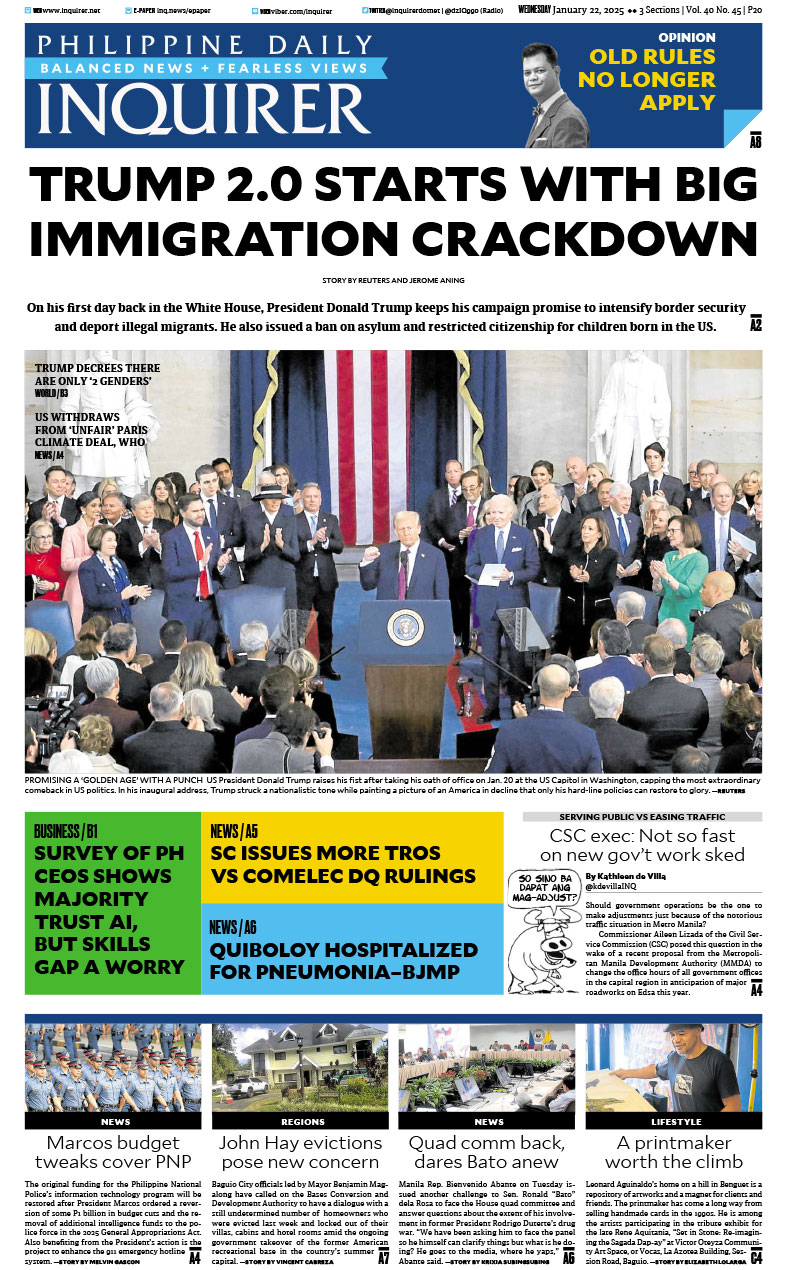 WASHINGTON DC/PIEDRAS NEGRAS, MEXICO — President Donald Trump on Monday kicked off his sweeping immigration crackdown, tasking the US military with aiding border security, issuing a broad ban on asylum and taking steps to restrict citizenship for children born on US soil.
WASHINGTON DC/PIEDRAS NEGRAS, MEXICO — President Donald Trump on Monday kicked off his sweeping immigration crackdown, tasking the US military with aiding border security, issuing a broad ban on asylum and taking steps to restrict citizenship for children born on US soil.
Declaring illegal immigration a national emergency, Trump ordered the Pentagon to provide support for border wall construction, detention space and migrant transportation, and empowered the secretary of defense to send troops to the border as needed.
Trump called for his administration to reinstate his “remain in Mexico” program, which forced non-Mexican migrants to wait in Mexico for the resolution of their US cases.
READ: Immigrants in US cities brace for expected Trump deportation arrests
Shortly after the inauguration, US border authorities said they had shut down outgoing President Joe Biden’s CBP One entry program, which had allowed hundreds of thousands of migrants to enter the United States legally by scheduling an appointment on an app. Existing appointments were canceled, leaving migrants stunned and unsure of what to do.
.
|
|
Trump, a Republican, recaptured the White House after promising to intensify border security and deport record numbers of migrants. Trump criticized Biden for high levels of illegal immigration during the Democrat’s presidency, but as Biden toughened his policies last year and Mexico stepped up enforcement, the number of migrants caught crossing illegally fell dramatically.

Republicans say large-scale deportations are necessary after millions of immigrants crossed illegally during Biden’s presidency. There were roughly 11 million immigrants in the US illegally or with a temporary status at the start of 2022, according to a US government estimate, a figure that some analysts now place at 13 million to 14 million.
“As commander in chief, I have no higher responsibility than to defend our country from threats and invasions, and that is exactly what I am going to do,” Trump said in his inaugural address.
Trump’s critics and immigrant advocates say mass deportations could disrupt businesses, split families and cost US taxpayers billions of dollars.

Americans have grown less welcoming toward immigrants without legal status since Trump’s first presidency, but remain wary of harsh measures such as using detention camps, a Reuters/Ipsos poll in December found.
|
|
.
Preparation in PH
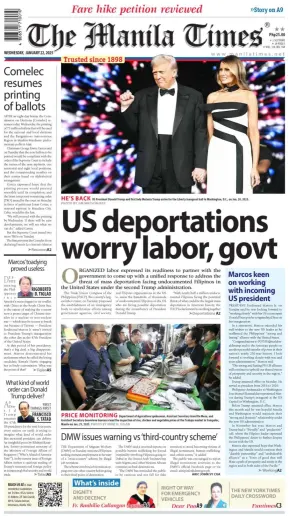
In Manila, the Trade Union Congress of the Philippines (TUCP), the country’s largest labor center, on Tuesday offered its help to the government in assisting undocumented Filipinos facing deportation from the United States.
“We are prepared to accelerate efforts to reintegrate returning countrymen not just through employment facilitation but also through public employment programs led by the swift full implementation of the Trabaho Para sa Bayan Act in synergy with [the labor and trade departments],” TUCP vice president Luis Corral said in a statement.
“Our returning Filipinos, especially the undocumented who braved foreign land for years or even decades of uncertainty, deserve a green lane to secure new, permanent and decent employment here in our homeland they rightfully call their own,” Corral added.
He also called for the establishment of an inter-agency body to “synchronize efforts” among government agencies, civil society and Filipino organizations in the United States, to assist would-be deportees.
The Department of Migrant Workers (DMW) estimates 370,000 undocumented Filipino immigrants in the United States.
DMW Secretary Hans Cacdac earlier said the agency, in coordination with the foreign, trade and labor departments, as well as the Overseas Workers Welfare Administration and the Technical Education and Skills Development Authority, was ready to offer upskilling, job-matching and reintegration programs for those who would be affected by the Trump administration’s crackdown.
|
|
.
Entry program shut down
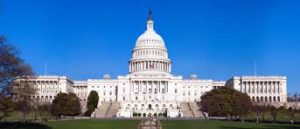
In several Mexican border cities, migrants saw their appointments on Biden’s CBP One app canceled just after Trump took office. Some 280,000 people had been logging into the app daily to secure an appointment as of Jan. 7.
Migrants waiting in Ciudad Juarez scrambled to find short-term rentals, buy bus tickets and call family members back home.
Daynna del Valle, a 40-year-old Venezuelan, spent eight months in Mexico waiting for an appointment that would have arrived on Tuesday. In that time, she worked at a nail salon but earned so little that she barely managed to send any money back to her mother in Colombia, a cancer survivor who needed medical treatment for her blood pressure.
“I’m lost,” she said. “I don’t know what to do, where to go.”
Denia Mendez, a Honduran sitting in the courtyard of a migrant shelter in Piedras Negras—across from Eagle Pass, Texas—opened her email inbox 30 minutes after Trump became president. She stared at an email for several minutes, reading it over and over, before her eyes welled up.
“They canceled my appointment,” she said.
Several other migrants, who just minutes ago were laughing as they fed potato chips to pigeons, huddled around her phone, their faces suddenly grave.
|
|
.
Birthright citizenship
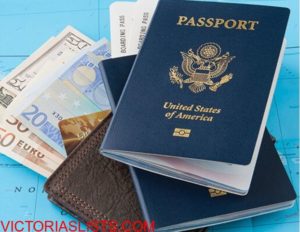
In his order focused on so-called “birthright citizenship,” Trump called on US agencies to refuse to recognize the citizenship of US-born children without at least one US citizen or permanent resident parent, applying the restrictions in 30 days.
His order prompted the swift filing of a lawsuit in federal court in New Hampshire by Aclu and other groups, who argued that Trump’s order violated the right for anyone born in the United States to be considered a citizen enshrined in the Citizenship Clause of the US Constitution’s 14th Amendment.
“Denying citizenship to US-born children is not only unconstitutional—it’s also a reckless and ruthless repudiation of American values,” Anthony Romero, Aclu’s executive director, said in a statement.
|
|

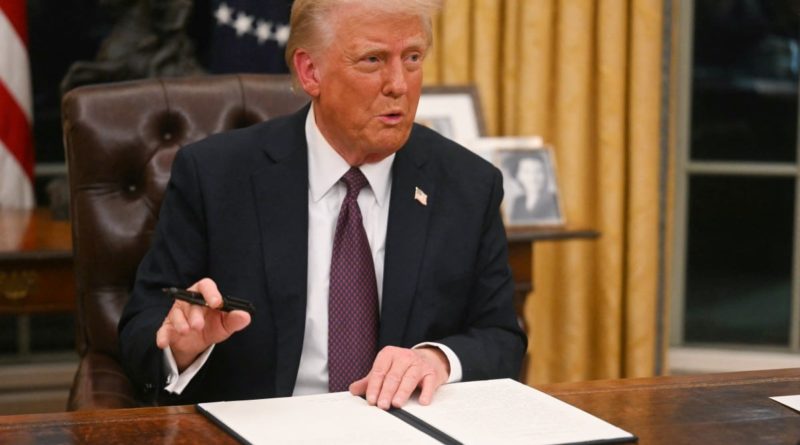

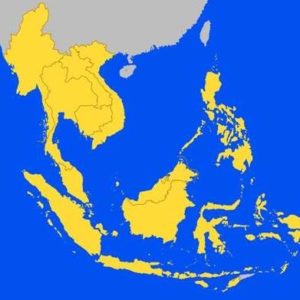
 Memento Maxima Digital Marketing
Memento Maxima Digital Marketing






